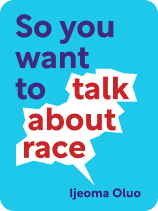

This article is an excerpt from the Shortform book guide to "So You Want to Talk About Race" by Ijeoma Oluo. Shortform has the world's best summaries and analyses of books you should be reading.
Like this article? Sign up for a free trial here .
Are you looking for So You Want to Talk About Race discussion questions? What are some of the key themes and ideas to discuss?
In So You Want to Talk About Race, Ijeoma Oluo offers a handbook on how to have intelligent, productive, empathic conversations about race. The following So You Want to Talk About Race discussion questions will help you reflect on the key issues discussed in the book and examine them in the context of your own life.
Here are some So You Want to Talk About Race discussion questions and exercises that tackle some of the book’s key themes.
So You Want to Talk About Race: Discussion Questions
Nigerian-American writer Ijeoma Oluo worked for many years in the tech industry, where she was often the only black person in the room. She wrote So You Want to Talk About Race as a handbook for people who want to have productive conversations about race in the United States.
The following So You Want to Talk About Race discussion questions and exercises will help you explore the key issues discussed in the book and consider how they play out in your own life. You can use these questions to inform a classroom or book club discussion and work through them on your own to better internalize Ijeoma’s message in So You Want to Talk About Race.
Exercise 1: Explore Intersectionality
Examine how intersectionality works in your own life.
Write down a list of all of the social descriptors you can think of that might apply to you (for example white, Hispanic, neurotypical, Hindu, thin, etc.)
Which of these categories confer privilege? In what ways?
Which confer disadvantage?
Can you think of any ways in which these privileges and disadvantages change, compound, or offset each other?
Exercise 2: Consider the Role of History in Current Oppression
Think more about the role of racist history in today’s patterns of inequality.
The historical events and processes that you read about in this chapter are by no means exhaustive. Can you think of another racially charged historical event or situation that wasn’t mentioned?
What echoes of this event or situation can you still see today?
Exercise 3: Reflect on Microaggressions
Examine the belief structures hidden in microaggressions.
Most of us have done things or made comments that we thought were innocent, only to find out later that they were offensive. Describe a time that this happened to you. (Perhaps the person on the receiving end let you know that the comment was inappropriate, or perhaps you only found out by reading this book or seeing information elsewhere.)
Identify the hidden belief structures embedded in that comment. What concrete effects do these same beliefs have in people’s lives?
Exercise 4: Think About Cultural Appropriation in Your Own Life
Identify some ways in which you might be participating in cultural appropriation.
What activities do you participate in, items of clothing do you wear, and/or music do you listen to that originated in a non-white culture?
In what ways have you benefited (financially, socially, or otherwise) from these activities? In what ways have other whites benefited?
What might you do to offset the effects of this cultural appropriation?
Exercise 5: Go Beyond the Conversation
Think about ways you can put your new understandings into practice.
You can take action in the political, economic, educational, workplace, and personal spheres. Pick two of these categories and list some specific things you could do in these categories.
It’s likely that you’ll need some more information before you implement at least some of these changes. How might you go about getting this information?
Final Words
From intersectionality and implicit racism to cultural appropriation and systemic racism in education, Ijeoma Oluo’s So You Want To Talk About Race has a wealth of discussion-worthy topics to talk about. We’ve developed this series of discussion questions for So You Want To Talk About Race to bring the reader’s mind to racial equality and equip them with the tools to participate in empathic and productive conversations about race. You can use these questions in a classroom or work through them on your own. And you can find more discussion questions in our summary of So You Want To Talk About Race.

———End of Preview———
Like what you just read? Read the rest of the world's best book summary and analysis of Ijeoma Oluo's "So You Want to Talk About Race" at Shortform .
Here's what you'll find in our full So You Want to Talk About Race summary :
- How to have an intelligent, empathetic conversation about race
- Why people are afraid to talk about race
- Where racism came from and what fuels it






